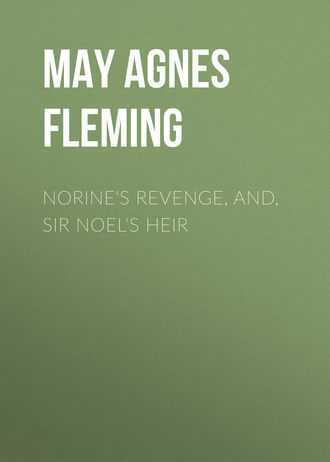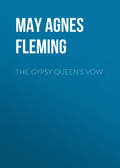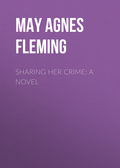
May Agnes Fleming
Norine's Revenge, and, Sir Noel's Heir
CHAPTER XI.
GONE
Laurence Thorndyke strode rapidly back over the sands to where Norine stood. She had not gone into the house, she was leaning against a green mound, her hands hanging listlessly before her, the white, startled change on her face still. Laurence was going away – in an aimless sort of manner she kept repeating these words over and over, Laurence was going away!
"I've made a devil of a mess of it," thought Mr. Thorndyke, gnawing his mustache with gloomy ferocity. "What an unmitigated ass I have been in this business! Liston's right – a mock marriage is no joke. I can make my escape from her now, but the truth's got to be told, and that soon. And what is to hinder her taking her revenge and blowing me sky-high, as I deserve? One whisper of this affair, and Darcy disinherits me, Helen jilts me, and then – good Heaven above! what a fool I have been."
Yes, Mr. Thorndyke had been a fool, and was repenting in sackcloth and ashes. To gratify a passing fancy for a pretty face may be a very pleasing thing – to take revenge upon a man who has interfered with one's little plans, may also be a pleasing thing, but to cut off one's own nose to spite one's own face, is something one is apt to regret afterwards. It was Mr. Thorndyke's case. He had taken Richard Gilbert's bride from him at the very altar, as one may say, and he had gloated over his vengeance, but what was to hinder Norine Bourdon from rising, strong in her wrongs and betrayal, and ruining him for life? She was the gentlest, the most yielding of human beings now, and she loved him; but is it not those whom we have once loved best, we learn afterwards to hate most bitterly? He had cruelly, shamefully wronged and deceived her – what right had he to look for mercy in return? As he had sown, so must he reap.
She scarcely turned at his approach. How pale she was, and the large dark eyes she lifted were full of a child's startled terror.
"Norine," he abruptly began, "there is no help for it – I must go to New York to-morrow."
Her lips trembled a little.
"To-morrow," she repeated, under her breath – "so soon!"
"Rather short notice, I admit, but then you see it – it isn't for a lifetime. All husbands and wives part once in a while and survive it. Come, Norine," with irritated impatience, "don't wear that woe-begone face! I'm not to blame, I can't help it. You don't suppose I want to leave you. But here's Liston – my uncle's man. You heard him yourself. You saw the letter commanding my return."
"The letter," she repeated, looking at him; "there were two!"
"Ah – yes – two, so there were. But the other was merely a note from a friend. I leave at noon to-morrow, so see that my valise is packed, and everything all right, that's a good child. And do try to get rid of that white, reproachful face, unless you want it to haunt me like the face of a ghost."
He spoke with irritated petulance – at war with her, with himself, and his smouldering ill-temper breaking forth. It was the first time he had ever spoken sharply to her. A faint flush rose to her cheeks. She clasped both hands around his arm and looked up in his moody, discontented face with piteous imploring eyes.
"Don't be vexed, Laurence; I don't mean to reproach you, indeed, and I know you cannot help it. Only, dear, I love you so much, and – and it is our first parting, and I have been so happy here – so happy here – "
For a minute her voice broke, and she laid her face against his shoulder.
Mr. Thorndyke smothered a suppressed groan.
"O Jupiter! here it is! Tears, and scenes and hysterics. I knew how it would be, they all will do it, every chance. Norine!" – aloud and still impatient – "for pity's sake, don't cry – it's something I can't stand. Here! I'll throw my uncle, his fortune and favor, and all the hopes and ambitions of my life to the winds, and stay here, and bill and coo, all the rest of my life. If I can't go in peace I won't go at all."
She lifted her head as if he had struck her. Something in his tone, in his words, in his face, dried her tears effectually, at once and forever.
"I beg your pardon, Laurence," she said, suddenly, in an altered voice. "I won't cry any more. Shall I go and pack your valise now or leave it until to-morrow morning?"
He glanced at her uneasily. The dark, soft eyes looked far away seaward, the delicate lips had ceased to tremble, the small handsome face had grown resolutely still. What manner of woman he wondered, was this girl going to make?
"Norine! You are not offended?"
"Offended – with you, Laurence? No, that is not possible."
"You love me so much, Norine?"
"I have given you proof whether I love you or no. I am your wife."
"Yes, of course, of course!" hastily; "but Norine – see here – suppose in the future I did some great wrong – deserted you for instance – no, no! don't look at me like that – this is only a suppositious case, you know!"
The large dark eyes were fixed full upon him. He laughed in rather a flurried way, and his own shifted and fell.
"Go on," she said.
"Suppose I deserted you, and it was in your power to take revenge, you would hate me and take it – would you not?"
Into the dark, tender eyes there leaped a light – into the youthful, gentle face there came a glow – around the soft-cut, childlike mouth there settled an expression entirely new to Laurence Thorndyke. One little hand clenched unconsciously – she caught her breath for a second, hard.
"Yes," she said, "I would!"
The answer staggered him – literally and truly staggered him. He had not expected it – he had looked for some outbreak of love, some tender, passionate protest.
"Norine!" he cried, "you would! Do you know what you are saying? You would hate me, and ruin me for life if you could?"
She looked at him full.
"If you deserted me, would you not hate me? Would I not be ruined for life? And does not the Book of books say: 'An eye for an eye, a tooth for a tooth, a life for a life.' Yes, Laurence – if I did not go mad and die, I would hate you more then I love you now, and be revenged if I could!"
Then there was a silence. He had grown pale as herself, and stood quite motionless looking at the sea. He knew what he had to expect at last.
Norine was still clinging to his arm. He disengaged it abruptly, and without a word or look, walked away from her. A moment she stood – then two little hands clasped the arm once more, a pleading voice spoke, and the sweet, tender face of Norine looked imploringly up at him.
"Laurence – dearest Laurence! I have angered you again. But you asked me a question and I had to answer it. Forgive me."
He turned away from her resolutely.
"There is no forgiveness needed, Norine. I admire your truthful and plain-spoken spirit. Only you see I thought Norine Bourdon a loving, gentle, forgiving little soul, who cared for me so much that she was ready to forgive me seventy-times-seven, and I find, according to her own showing, she is a strong-minded woman, ready to wreak vengeance for the first wrong done her – ready for love or hatred at a moment's notice. It is well you told me – it is always best to understand one another. No, we won't have any tender scenes, if you please, Mrs. Laurence – I have found out exactly what they are worth." He pulled out his watch. "I have business over in Boston, and as it is growing late I will be off at once. If I am very late – as is likely – I must beg you will not sit up for me. Good-afternoon."
He lifted his hat ceremoniously, as to an indifferent acquaintance, and walked deliberately away.
She stood stock still where he had left her, and watched the tall, active figure out of sight. Then she sat down, feeling suddenly weak and faint, and lay back against the green mound. For a moment sea, and sky, and sands swam before her in a hot mist, and then the faintness passed away, leaving her tearless and trembling.
What did he mean?
He had talked of deserting her? Did he mean it? A hand of ice seemed to clutch her heart at the thought. No no, no! he had only been trying her – proving what her love was worth. And she had answered him like that she would hate him and be revenged. He had called her a "strong-minded woman," – a term of bitter reproach – and no wonder. No wonder he was angry, hurt, outraged. Why had she said such a horrible thing? She hardly knew herself – the words seemed to have come to her instinctively. Were they true? She did know that either – just now she knew nothing but that Laurence had left her in anger for the first time, that he would probably not return until to-morrow morning, the fateful to-morrow that was to take him from her for – how long?
She broke down then, and laying her face against the soft, cool grass, gave way to a storm of impassioned weeping, that shook her like a reed. "The strong-minded woman" was gone, and only a child that had done wrong and is sorry – a weak girl weeping for her lost lover, remained.
The afternoon waned, the twilight fell, the wind arose chilly from the sea. And pallid as a spirit, shivering in the damp air, silent and spiritless, the younger Miss Waddle found her when she came to call her in to supper.
She drank her tea thirstily, but she could eat nothing. Immediately after the lonely meal, she hastened to her room, and throwing a shawl around her, sat down in the easy chair by the window to watch and wait. He had told her not to sit up for him – it would annoy him probably to be disobeyed, but she could not go to bed, for in the darkness and the quiet, lying down, she knew how she would toss wakefully about until she had thought herself into a fever.
Night fell. Outside the sea spread black, away until it melted into the blacker sky. The wind sighed fitfully, the stars shone frostily bright. Inside, the little piano in the parlor, played upon by the elder Miss Waddle, after her day's teaching, made merry music. In the intervals, when it was silent, the younger Miss Waddle read chapters aloud from her latest novel. Ten, eleven struck, then the parlor lights went out, doors were locked, and the Misses Waddle went up stairs to their maiden slumbers.
The pale little watcher by the window sat on, hoping against hope. He might come, and be it late or early she must be awake and waiting, to throw herself into his manly arms and implore his lordly pardon. She could never sleep more until she had sobbed out her penitence and been forgiven. But the long, dark, dragging, lonely hours wore on. One, two, three, four, and the little, white, sad face lay against the cold glass, the dark, mournful eyes strained themselves through the murky gloom to catch the first glimpse of their idol. Five! the cold gray dawn of another day crept over sea and woodland, and worn out with watching, chilled to the bone, the child's head fell back, the heavy eyelids swayed and drooped, and she lay still.
So, when two hours later Mr. Laurence Thorndyke, smelling stronger than ever of cigars and brandy, as the younger Miss Waddle's disgusted nose testified, came into the silent chamber, he found her. The pretty head, with all its dark, rippling ringlets, lay against the back of the chair, the small face looked deathly in its spent sleep. She had watched and waited for him here all night. And remembering how, over the card table and the wine bottle, his night had been passed, utterly forgetful of her, the first pang of real unselfish remorse this young gentleman had ever felt, came to him then.
"Poor little heart!" he thought; "poor little, pretty Norine. I wish to Heaven I had never heard of Gilbert's projected marriage – I wish I had never gone back to Kent Farm."
Five hours later, and white and tearless, Norine is clinging to him in the speechless pain of parting. Is there some presentiment, that she herself cannot understand, even now in her heart, that it is forever?
"Don't —don't look so white and wild, Norry," he is saying hurriedly. "I wish, I wish I need not leave you. Little one – little Norry, whatever happens, you – you'll try and forgive me, won't you? Don't hate me if you can help it."
She does not understand him – she just clings to him, as though death were easier than to let him go.
"Time's up, Mr. Laurence!" calls out the sharp voice of little Mr. Liston, sitting in the light wagon at the door; "if you linger five minutes more we'll lose our train."
"Good-by, Norine – good-by!"
He is glad to be called, glad to break away from the gentle arms that would hold him there forever. He kisses her hurriedly, frees himself from her clasp, and leaves her standing stricken and speechless in the middle of the floor.
"Thank Heaven that's over!" he says, almost savagely, "drive like the devil, Liston! I won't breath freely until I am out of sight of the house."
Mr. Liston obeys.
She stands where he has left her, rigid, tearless, white, listening to the rapid roll of the wheels over the gravel, over the road, growing faint and fainter, and dying out far off. Then she sinks down, and she and her lover have parted forever.
CHAPTER XII.
THE TRUTH
A bleak autumnal afternoon, a gray, fast-drifting sky overhead, a raw wind sweeping up from the shore, the sea itself all blurred and blotted out in the chilly, creeping fog. At the parlor-window of Sea View Cottage, Norine stands looking wistfully, wearily out. Three weeks have passed since her husband left her – it is seven weeks altogether since the memorable night of her elopement. These last three, lonely weeks have wrought their sad, inevitable change. The small face has grown smaller the large dark eyes seem unnaturally large for the wan face. A sad, patient light fills them. The slight form has grown fragile, the hands that hang loosely clasped before her are almost transparent. As she stands here watching, waiting, she slips, unconsciously, her wedding ring up and down her finger. So thin that finger has grown that every now and then the ring drops loosely off altogether. Within, it is pleasant enough. A fire burns brightly in the grate, Miss Waddle's canaries bask in the heat, singing blithely, and the younger Miss Waddle sits at her desk immersed as usual, fathoms deep in ink, and romance. The inspiration of genius is evidently strong upon the younger Miss Waddle this afternoon, for her pen rushes madly along the paper, her hair is uncombed and twisted in a tight knot at the back of her head. Profound stillness reigns, the ticking of the clock the purring of puss on the rug, the chirping of the canaries, the light fall of the cinders, the sighing of the fitful wind, and the monotonous scrape, scrape, scrape, of the literary lady's pen – that is all.
At last —
"There!" cries the younger Miss Waddle, drawing a deep, intense breath of relief, "I've done with you for one day! Let the printer's devil come when he likes, I'm ready for him."
She nods at the blotted and scratched pile of MSS., wipes her pen in her hair, falls back in her chair, and looks at the clock.
"Half-past five, as I'm a sinner, and the kitchen fire not lit yet. 'Lizabeth will be home to her tea at six, as hungry as a bear. A minute ago I was writing up the sayings and doings of dukes and duchesses, now I must go and kindle the kitchen stove. Such is life – with authoresses, but a step from the sublime to the ridiculous. Mrs. Laurence, my dear child, it's of no use your straining the eyes out of your head. Whether there's a letter for you or not, my sister won't be here with it for the next half hour."
Norine clasped her hands.
"Oh!" she said, "surely, there will be a letter for me to-day."
"I hope so, I'm sure. It's uncommonly odd Mr. Laurence doesn't write, but then, as a rule, I believe men hate letter writing. Maybe he's on his way here and doesn't think it worth while – it will come out all right, depend upon it. So cheer up, Mrs. Laurence, my dear, and don't wear that woful face. You've grown as thin as a shadow during the last two weeks. You must take care or your handsome husband will be disenchanted when he sees that pallid countenance. Tell you what, Mrs. Laurence, you ought to have something to do."
"Something to do?" Norine said faintly.
"Something to do, my dear – sewing, drawing, playing, reading, writing – anything but moping about this way – waiting, waiting, waiting, and getting the horrors. It doesn't fetch him any the sooner, nor a letter from him either, and it is just killing you by inches. What a pity now," said the younger Miss Waddle, gathering up her manuscript in a heap, "that you couldn't write a story. You couldn't, I suppose?"
"I am afraid not," Norine replied, smiling. "I am not at all clever in any way. I only wish I could write stories and earn money as you do."
"Yes, it's very nice and handy," said the younger Miss Waddle, "when you're not 'respectfully declined.' I have been 'respectfully declined' oftener than I like to think of. But I am going to make a hit this time, if I die for it."
"Yes," said Norine, gazing in respectful awe at the smeary looking pile of writing; "what do you call it?"
"This," said the authoress, slapping her hand on the heap, "is my first novel, to run in serial form in the Flag of the Free. Its name is the 'Demon Dentist; or the Mystery of the Double Tooth!' What do you think of that?"
"The Demon —what?" asked Mrs. Laurence, rather aghast.
"'The Demon Dentist.' The title is rather a striking one, I think, and Sir Walter Scott says a good name is half the battle. And, I flatter myself, the plot is as original as the title. Lord Racer, only son of the Earl of Greenturf, the hero of the story, steals the Lemon stone, the magnificent family diamond, and hides it – where do you think? Why he goes to the Demon Dentist, gets his wisdom tooth excavated, buries it in the cavernous depths of the molar, has it cemented up again, and there it is! Search is made, but no one thinks of looking in Lord Racer's lower jaw, of course. Wilkie Collins has written a novel about a man who steals a diamond in his sleep, but I rather think my idea is a step ahead of Mr. Wilkie Collins. Finally the Demon Dentist murders Lord – oh gracious me! here's 'Lizabeth, and tea not ready."
Miss Waddle the younger jumped up in consternation, scuttled the "Demon Dentist," headforemost, into her desk, and made a rush for the kitchen, as Miss Waddle the elder opened the parlor door.
Norine took a step forward, her face flushing, her eyes kindling with eager hope, her breath coming quick. She did not speak a word, and one glance into Miss Waddle's pitying face answered that breathless look.
"No letter yet, Mrs. Laurence," she said very gently. "I waited for the mail."
She did not speak a word. She sat down suddenly, sick – sick to the very heart with the bitter sense of the disappointment. The flush faded from her face, the light from her eyes; she drew a long, dry, sobbing breath, folded her arms on the table and laid her face upon them.
"Poor little soul!" thought the elder Miss Waddle looking at her in silent compassion. "What brutes men are."
Miss Waddle's experience of the nobler sex was limited, but her sentiment in the main was a correct one. It was peculiarly correct in the present instance, for since that morning three weeks ago, when Laurence Thorndyke had left Sea View Cottage, not a word, not a message, not a letter had come from him. How the lonely, longing girl left in the dull little house, watched and waited, and prayed, and grew sick to the soul, as now, with disappointment, only those who have watched and waited in vain, for the one they love best on earth, can know.
Was he sick – was he dead – was he faithless. Why, why, why did he not write?
They were the two questions that never left the girl's mind. She lost the power to sleep or eat, a restless fever held her. She spent her days, the long, vapid, sickening days, gazing down the road he must come, the nights in wakeful, frightened thought. The one event of the twenty-four dreary hours, was the coming home of the elder Miss Waddle from Chelsea; the one hope that upheld her, the hope that each day she would bring her a letter. All this long, bleak day she had lived on that one feverish hope, and now she was here, and there was none – none!
The moments wore on. She lay there prostrate, crushed, never moving or lifting her head. Miss Waddle the elder bent over her with tears of compassion and indignation in her kindly, spinster eyes.
"Dear child," she said, "don't take on like this. Who knows what to-morrow may bring? And if it brings nothing, there isn't a man on earth worth breaking your poor heart for, as you're doing. They're a set of selfish, heartless wretches, every one – every blessed one!" said the elder Miss Waddle, vindictively; "so come along and have a cup of tea, and don't pine yourself to death for him. I daresay, if the truth were known, he's not pining much for you."
Norine lifted her face – such a sad, pathetic, patient little face.
"Don't, Miss Waddle," she said, "you mean well, I am sure, but I can't bear it. He does not intend to forget or neglect me. He is ill – I know that. He is ill, and I don't know where he is, or how to go to him. No, I don't wish any tea, a mouthful of food would choke me, I think. I will go down to the beach instead. I – I would rather be alone."
The gentle lips quivered, the gentle voice trembled over the loyal, wifely words. Not neglectful, not faithless, only ill, and unable to write – she crushed every other thought out of her heart but that. She rose, took her hat, and quitted the room. Miss Waddle looked after her, and shook her head dismally.
"Poor dear!" she thought, "only ill, indeed! Mr. Laurence, if that be his name, is a very good-looking young man, and there, it's my opinion, the young man's goodness begins and ends. He may not have deserted her, but it looks uncommonly like it. Why, he was tired of her before they were here a week."
Then Miss Waddle, the elder, went and took "tired Nature's sweet restorer, balmy" – tea, and Mrs. Laurence, with all hope and life crushed out of her fair young face, went down along the sands, where so often in the first happy days they had wandered together. Only seven weeks ago since she had left all for him – friends, home, lover, truth and honor – why, it seemed years to look back upon. She felt old and worn and tired – a horrible creeping fear clutched her heart. Why did he not write – why did he not come?
She reached the little grassy hillock and sat down, too weak and spiritless, even to walk on. Cold and gray, the twilight was falling, cold and gray spread the low lying twilight sky, cold and gray the dim sea melted into it in the distance, cold and gray like her life. It was very lonely, no human being besides herself was to be seen, not even a sea bird skimmed the sullen waters. With her hands folded in her lap, her sad, yearning eyes fixed on the dreary sea, she sat still, thinking, thinking. Why did he not write – why did he not come?
Suddenly, coming as if from the cottage, a figure appeared in view, the solitary figure of a man, moving rapidly toward her over the sands. She looked up quickly, uttered a faint cry of recognition and hope. As he had come abruptly upon them once before, Mr. Liston came abruptly upon her again. Then it had been to bear her darling away from her – now it was to bring her news of him, she knew.
She did not rise to meet him. Her heart beat so fast with alternate hope and fear that for an instant she turned faint. In that instant he was beside her. He lifted his hat.
"Mrs. Laurence?" he said, interrogatively, "they told me at the house I should find you here. They wished to call you in, but this is a better place for our meeting, so I sought you out."
She made a breathless, impatient gesture.
"You have a letter for me?" she said, hurriedly; "he sent you – he is well?"
"He sent me – yes. And he is well – oh, yes. I have a note for you, too, from him, but I will not show it to you just yet, if you will allow me. My dear young lady, I have come – he has sent me on a very hard and embarrassing errand, indeed."
Something in the man's face, in the man's tone, even more than his words, made her look quickly up. To his dying day, James Liston never forgot the haunted, terrified look in those dilating, dark eyes. She laid her hand over her fast beating heart, and spoke with an effort.
"He is well, you say?" she panted.
"He is well, Mrs. Laurence. It were better for you he were dead."
"Sir!" she cried, the light leaping to her eyes, the flush to her face; "how dare you! He is my husband – how dare you say such a thing to me!"
"He is not your husband."
The low, level, monotonous voice spoke the dreadful words, the small, light, glimmering eyes were fixed immovably upon her with a look, half-contemptuous, half-compassionate, in their depths.
She rose slowly to her feet, and stood blankly staring at him. Was the man mad?
"Not my – " she paused irresolute. Should she run away from this madman or stand her ground. "Give me my letter!" she said, angrily; "I have nothing more to say to you!"
"Because I tell you Laurence Thorndyke is not your husband? My child, it is true."
His tone was solemn – his face full of compassion. What a child she was, he was thinking; how she loved him. What was there about this young fellow that women should give up all that made their lives most dear, for his sake?
"I told you, Mrs. Laurence, I have been sent here on a hard and painful errand. He sent me. 'Conscience makes cowards of us all.' He is a coward as well as a villain, and he had not the courage to face you himself. You have been watching and waiting for his return, I know. Watch and wait no longer; you will never see Laurence Thorndyke again."
A cry broke from her lips – a cry that rang in his ears his life long – a cry not loud, but exceedingly bitter.
"In Heaven's name, speak and tell me what is it you mean?"
"This: You are not a wife – Laurence Thorndyke never married you. He deceived and betrayed you from the first; he has deserted you forever at the last. That is the task he has set me. I am but a poor diplomat to break bad news, as they call it, to any one, so I blurt out the truth at once. After all, it is the same in the end. He never meant to marry you – he never cared for you enough. He hated Richard Gilbert – that was the beginning and end of it. He hated Gilbert, Gilbert loved you, and was about to make you his wife; to revenge himself on Gilbert, he went back to Kent Hill and carried you off. He knew you loved him, and it would not be a difficult task. It seems easy enough for all women to love Laurence Thorndyke."
The last words, spoken more to himself than to her, were full of bitterness. A great stillness had fallen upon her – her eyes were fixed on his face, her own strained and fixed.
"Go on," she said, her teeth set hard.
"He took you away – how, you know best, and in Boston that mockery of marriage was gone through. Miss Bourdon the man Maggs was an actor, not a clergyman, a besotted drunkard, whom fifty dollars at any time would buy, rotten body and a filthy soul. 'She is as green as the fields she came from'; that is what Thorndyke said to Maggs, 'as innocent as her native daisies. She'll never know the difference, but she's one of the sort that will love a fellow to desperation, and all that sort of thing, and cry like a water-spout at parting, but who won't listen to a word without her wedding ring. Let her have her wedding ring – always take a short cut on a journey if you can.' So you got your wedding ring, and without license or witnesses, and by a half-drunken actor a sham ceremony was gone through. You were married to the scoundrel, for the sake of whose handsome face you gave up home and friends, and the love and honor of such a man as Richard Gilbert – one of the best and noblest men America holds to-day!"
The hand, pressed over her heart, clutched it tighter, as if in a spasm of uncontrollable pain.
"Go on," she said again.
"There's not much to tell. He brought you here, and in a week was bored to death and sick of it all. He was only too glad of the chance to go, and – he will never come back. Here is his note – read it – here is the money he gave me, to pay your board and take you back to your home in Maine. He thinks it is the best thing you can do."
With all the color stricken out of her face – dumb, still, white, tearless, and rigid, she had been standing in her awful despair. But at these last words she came back suddenly as it were from the dead.
"He said that?" she asked hoarsely. "He told you to take me back there – like this?"
"He did."
"My curse upon him – my curse follow him through life!"
The man before her actually recoiled. She had uplifted one arm, and in the gathering darkness of the night, she stood before him white and terrible. So, for a second – then she came back to herself, and tore open the note. Only half a dozen brief lines – the tragedies of life are ever quickly written.
"Believe all that Liston tells you. I have been the greatest scoundrel on earth to you, my poor Norine. I don't ask you to forgive me – that would not be human, I only ask you to go and – if you can – forget."
"L. T."
No more. She looked up – out over the creeping night, on the sea, over the lonely, white sands, and stood fixed and mute. The letter she had looked for, longed for, prayed for, she had got at last!
In the dead stillness that followed, Mr. Liston felt more uncomfortable, perhaps, then he had ever felt before in the whole course of his life. In sheer desperation he broke it.
"You are not angry with me, I hope, Mrs. Laurence; I am but his uncle's servant – when I am ordered I must obey. He was afraid to write all this; it would be a very damaging confession to put on paper, so he sent me. You are not angry with me?"
She put her hand to her head in a lost, dazed sort of way.
"Angry with you? Oh, no – why should I be? My head feels strange – dizzy, – I don't want to hear any more to-night. I think I will go home."
She turned slowly. He stood watching her with an anxious face. What he knew would come, came. She had walked some dozen yards, then suddenly – without warning, word or sound, she fell heavily, face downward, like a stone.







